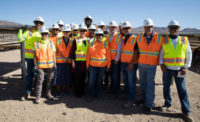About two years ago, Mike Greenawalt, senior vice president of operations for Rosendin Electric, noticed that injuries by employees using portable band saws were increasing as the company staffed up for the robust construction market.
Even normally careful workers were operating the newer, lighter and more powerful cordless units with just one hand even though they are designed for two: the dominant hand on the trigger handle and the other on a support handle across from it. Streamlining to improve the tool’s efficiency and flexibility had come with an unexpected hazard.
“Everyone wanted a portable band saw but many were misusing it. Some workers were using their free hand to catch the falling piece of pipe or strut, and they suffered some pretty bad injuries to their hands and wrists as the saw completed its cut,” says Greenawalt, who leads the Southwest and Mid-Atlantic divisions for the San Jose, Calif., contractor.
ENR ranks Rosendin No. 7 nationally in the Top 600 Specialty Contractors and No. 3 for the electrical sector. For the Southwest, the company is the No. 5 overall specialty contractor and No. 3 for electrical. From the approximately 60,000-sq-ft Tempe campus, the company employs 6,000 nationally and about 1,200 in the Southwest region.
“We trained and we retrained, we bought better gloves and sleeves and still experienced injuries, so we stopped the use of all portable band saws and went back to traditional stationary stands until we could stop the accidents,” says Greenawalt, a 40-year IBEW member who recalls his early days dragging heavy portabands on job sites.
The moratorium on portable band saws was effective at limiting injuries, but reduced efficiency, so Greenawalt promptly talked with staff, in particular, the craftworkers. “One said, ‘If you just had to keep your hands on the saw, this wouldn’t happen. Find us somebody with a tool that needs to run with both hands on it.’”
This configuration was not available, so Greenawalt contacted major construction-tool makers; no one seemed interested. Then Towson, Md.-based DeWalt called back. “They liked the idea,” he recalls. “They saw the inherent danger and said, ‘We can do that.’”
DeWalt is owned by Stanley Black & Decker, New Britain, Conn.
Directed by Joe Marchant, regional sales manager for the company’s construction trades division in Salt Lake City, the DeWalt team designed and created a prototype in just six weeks. Greenawalt and Rosendin workers tested it both in the company’s fabrication shop and in the field before suggesting some changes for convenience and durability.
Marchant, working with the product team at DeWalt, penciled the project to ensure profitability, beta-tested the tool and, approximately a year and a half later, in October 2018, began manufacturing and shipping product. Rosendin is in the process of purchasing these for its operations nationwide, and DeWalt is offering the Dual Switch Band Saw for sale to other construction companies.
Selling at just a slightly higher price than the single-trigger model, the new band saw is safer and smarter. Workers can’t tape or clamp the second switch to the support handle; this was suggested as a possible scenario to trick the tool. The triggers are sequenced; fail to follow this and the unit won’t start. And, if either trigger is released, the unit stops.
“This has been the first time for me to be involved with this kind of collaboration of helping to bring an idea to fruition,” Marchant says. “This tool demonstrates DeWalt’s continuing desire to make products that protect our end-users.”
At the Associated General Contractors 100th-anniversary Denver convention in April, Rosendin won the AGC of America and Willis Towers Watson – 2019 Construction Safety Excellence Award (CSEA) First Place Specialty Contractor for companies with more than 4 million worker hours. The new dual-trigger band saw was the centerpiece for the company at the event.
Employees are returning from jobsites and reporting their approval, and injuries have already been significantly reduced, says Greenawalt, who was gifted the first production unit, 000001, from Marchant and DeWalt.
He compares it to the first blade guard on a skill saw decades ago. “There’s no reason for any prudent contractor not to buy this tool and move forward with the industry. We’d like to see every tool that has two handles also have two switches to keep your hands on the tool.”
The new band saw aligns with the company’s safety-first culture: care, share, listen and innovate. “It’s good to protect our workers,” he says. “We want them to go home every night, with no cuts, bruises or scars.”
Specifications are at dewalt.com/products/power-tools/saws/band-saws/20v-max-5-dual-switch-band-saw-kit/dcs376p2.





-(1).jpg?height=200&t=1630583717&width=200)
